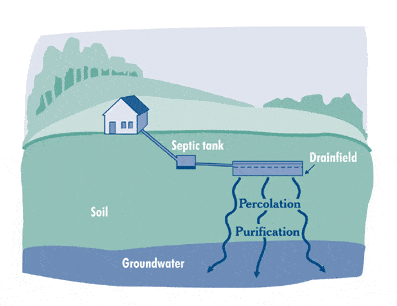Disclosure: This post contains affiliate links, meaning we may earn money or products from the companies mentioned in this post if you purchase a product through one of our links. An example would be Amazon.
Can Heavy Rain Affect Septic Systems?
We all should really be keeping tabs on the weather, especially if you have a septic system on your property. Septic systems are designed to handle water in high volume. However, heavy rain and the excessive water it brings can overwork your septic system.
Without proper precaution and maintenance, heavy rain can impact your septic system
How do heavy rains affect septic systems? Voluminous rainfall can possibly flood the ground around the
What Are Consequences of Flooded Septic Systems?
Backed up septic systems may also occur when your drainfield gets clogged with debris. Heavy rainfall could wash dirt, gravel, and plant waste into drainfields, causing problems of clogging and backed up plumbing. Clogged drainfields risk groundwater contamination in your immediate environment because wastewater is not properly drained. Instead of completing the entire filtering process, wastewater pools on the surface of the drainfield and makes its way to nearby streams, rivers, lakes, or public water reservoirs.
Another ill effect of a flooded septic system is the leakage of untreated effluent into the ground. When your drainfield is flooded, it becomes overworked and unable to treat effluent fully and properly. Untreated sewage will then leak into the groundwater, posing damaging risks to the environment and to everyone’s health.
How to Prevent Septic System Problems Due To Heavy Rain
We, of course, can never control when heavy rains will (or will not) come, but there are ways we can prepare our septic systems for the heavy rains when they do.
The best way to prevent septic system problems in the face of heavy rainfall is to make sure that your septic system is in good shape before the deluge comes. Septic system problems can be more difficult to manage if your septic system has not been properly maintained and the tank is in need of pumping. The emptier your septic tank is at the time of heavy rain, the less likely it is for your septic system to get flooded. Avoid flushing non-flushable items down the toilet. As much as you are able, limit your water usage during heavy rain. If possible, do not run your dishwasher or washing machine during extreme rains. So you are able to prevent septic system flooding during heavy rain, conduct regular maintenance of your system.
Divert rain water away from the drainfield so you can keep the surrounding ground soil from getting extra soggy. Keep your rain gutters clear of debris and ensure that all gutters drain away from the area of your drainfield.
Do not drive heavy equipment or any other vehicle that could press on the soil over the drainfield. Compacted soil can reduce the drainfield’s ability to process wastewater. Plant grass (only grass) above your drainfield.
Think Before You Flush: What Not to Flush Down Your Toilets to Keep Your Septic System Functioning at it’s Best During Heavy Rain.
Feminine Products. Products like sanitary pads, tampons, or feminine wipes will clog up plumbing and pose problems for your septic system. Rather than flushing these products down the toilet, wrap these in toilet or scrap paper and dispose in garbage bins.
Wet Wipes. Adult and baby wet wipes are likewise obvious culprits that clog and backup sewage pipes. Despite some brands being marketed as safe to flush, remember that just because the wipes can pass through your toilet, it doesn’t mean that they aren’t harmful. Do not flush wet wipes down the toilet; throw them away in the trash can instead.
Cooking Grease. Grease should never be poured down any drain. Though it may appear like any other liquid that can be easily drained, grease congeals and clogs up your pipes when it cools. Instead, collect grease in a glass jar and throw it away in the trash.
Diapers. Diapers are manufactured to expand in water. Diapers flushed down the toilet are likely to get caught in the pipe’s U-bend.
Other items. Never flush items like dental floss, Q tips, cotton balls, pills, cigarette butts, and the like down the toilet. Non-biodegradable substances like these have the potential to cause serious plumbing or drainage clogs and eventual environmental damage.
Water Conservation Tips to Relieve Your Septic System During Rain Storms
Find and fix leaks. Leaky toilets are the leading cause of excess water usage in the home. If the leak is severe enough, this could cause you to actually throw away hundreds of gallons of water in a day. Additionally, leaky faucets can waste at least 10 gallons of water each day. Ensure that these fixtures don’t leak and waste water. Resolve all fixture leaks as soon as you notice them and avoid overworking your septic system.
Water efficient fixtures. Using fixtures particularly designed to be water efficient helps reduce your water usage by as much as 50%. Fixtures such as low-flow shower heads, sink faucet aerators, or low-flush toilets are built to significantly improve water efficiency. Although they might cost a little more to install than the typical fixtures, the reduction in your water consumption contributes to prolonging the life of your septic system.
Washing machine and dishwasher loads. Appliances like washing machines and dishwashers use huge amounts of water, and so using them sparingly will help you cut down. When you run them with half loads, you’ll just be using them more frequently than necessary. Make it a point to run your washing machine and/or dishwasher only when you can load them fully. This way, you not only cut down on overall water usage, you also diminish the strain on your septic systems significantly.
Signs that Your Septic System Needs Cleaning Before The Next Heavy Rains.
Pooling water. Areas of pooling water after heavy rains is quite normal, but if you are noticing a “mini lake” formation on or around your septic system’s drainfield, you should never ignore it. It could be a sign that your drainfield is overflowing. When your tank hits capacity, the solid waste inside it can clog the drainfield pipes and force liquid onto the surface. If you see this happening in that particular area of your lawn, it would be best to have your septic system pumped.
Inefficient Drains. Slow drains in your home or facility could be indicative of a potentially serious clog somewhere in your system. If your drains (and toilets, take note) remain to be slow-moving even after you’ve effected unclogging measures, it’s a possible indication that the system may be full.
Bad odor. A septic system collects, not just waste materials, but also all the “gray water” that comes from showering, dishwashing, laundry, etc. Add this with the “black water” coming from the toilets, what you have is a highly-odious mixture. If you notice any especially unpleasant, lingering odors in your yard, consider contacting your septic service immediately.
An extraordinarily healthy patch lawn. Unlike what many might believe, the grass over your septic bed should look identical as the grass in all the other areas of your lawn. If you see that the grass on your septic bed appears to be greener and lusher, this could be a sign that your septic system is leaching liquid waste. It could mean that your septic tank needs to be emptied or that it has to be checked for leaks.
Sewage backup. Sewer backup is the most obvious indication that your septic tank has reached full capacity. First, look for sewer backups that could be occurring in your lower drains, such as a basement bathroom or laundry. If you see this happening, it is recommended that you call a septic professional right away.
Do not wait for a septic system emergency. Have your system checked by your trusted septic service professionals to ensure that it is ready for heavy rains. If you suspect any damage to your septic system or if the water over the drainfield does not recede after a bout of extreme rains, have your septic tank inspected by septic service professionals and serviced as promptly as you are able. If silt and debris have been deposited into your septic tank, have your system pumped immediately. Remember to wait until the water has receded and the area is not saturated before actually opening the tank.
Without a doubt, septic tank systems truly play a vital role in any and every facility, be it your home or a business establishment. Every time anybody runs the tap, flushes the toilet or does the laundry, your septic tank system comes to life. Water (and the waste it carries) has to efficiently travel out of your facility and into what is hopefully a robust and properly-conditioned septic tank. Life, in general, and everything else is simply more sanitary when you have a septic system that does its work as flawlessly as it is built to.
[us_map]
RESOURCES
https://www.flohawks.com/blog/rainy-season-is-here-how-do-storms-impact-your-septic-system/
https://nearsay.com/c/484187/356220/how-heavy-rain-affects-septic-systems
https://septiccleaning.com.au/heavy-rain-can-affect-septic-systems/
https://blog.lyttleco.com/can-rain-cause-a-septic-backup-or-septic-drainfield-failure
https://blog.adbseptic.com/blog/can-rain-affect-my-septic-tank
https://www.vivint.com/resources/article/5-signs-your-septic-tank-needs-emptying
https://blog.adbseptic.com/blog/septic-system-overview-what-can-i-flush-down-the-toilet


